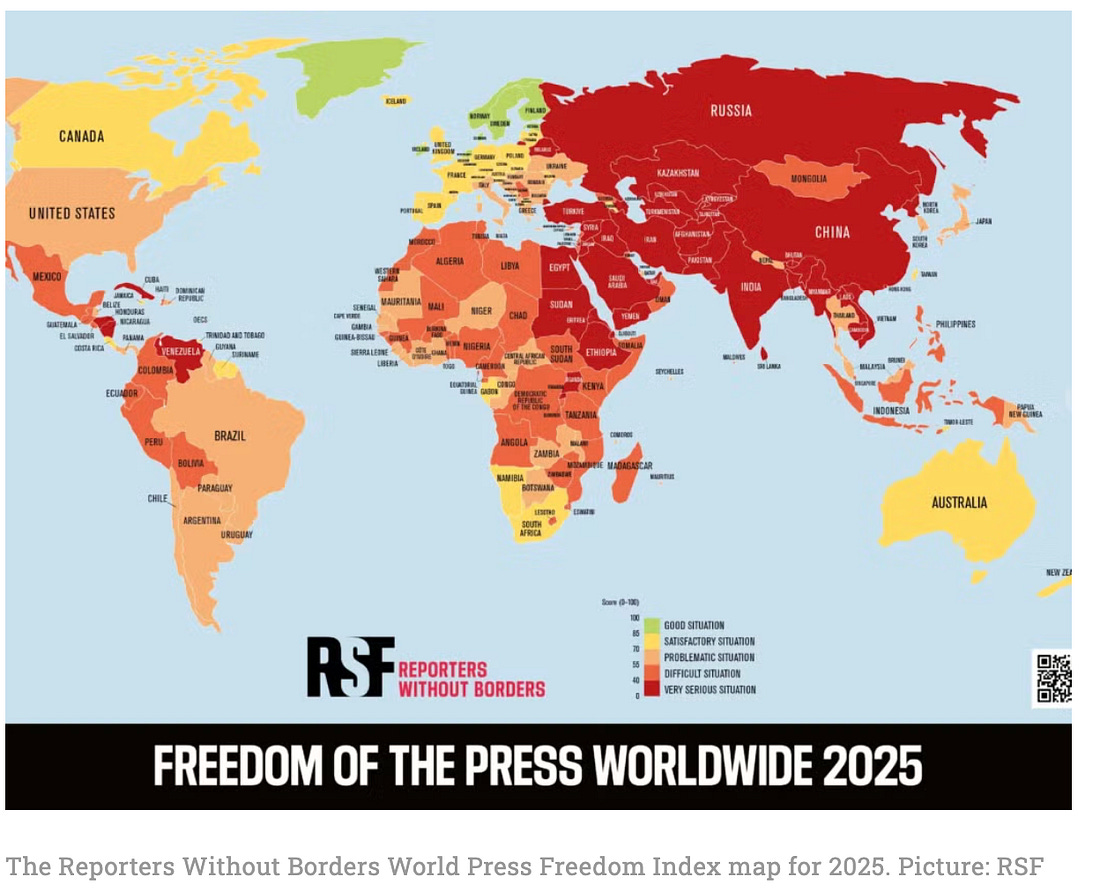You’re reading the My News Biz newsletter, which I will be sending you every other Thursday. My goal is to help you and other digital media entrepreneurs to find a viable business model that works for you. If you were forwarded this email, you can sign up here. Free speech playbook: How media are refusing to be silencedIndependent media in the U.S., Latin America, and Eastern Europe are resisting authoritarian pressure—and winning public trust.You’re reading the Your News Biz newsletter. My goal is to help digital media entrepreneurs find viable business models. Alarm bells ringingThe previous few weeks I’ve been writing about how autocrats in Latin America were silencing media organizations (here and here) that did not toe the party line.
News media around the world have begun to fight back against this trend of silencing free speech. The trend exploded into public view this year when the newly elected leaders of the world’s richest, most powerful nation, long a symbol of free speech to the rest of the world, began a campaign to silence the media. The public could possibly dismiss the press’s protests about the seating chart in the White House press room. But not the media response. You’re next on the hit listThe White House locked the Associated Press (AP) out of its press conferences and seat on Air Force One because they refused to refer to the Gulf of Mexico by the name preferred by President Trump — the Gulf of America. Julie Pace, the Associated Press’s executive editor, wrote in The Wall Street Journal, “For anyone who thinks the Associated Press’s lawsuit against President Trump’s White House is about the name of a body of water, think bigger. It’s really about whether the government can control what you say. “It’s nothing less than a brazen attempt to punish the AP for using words the president doesn’t like. It’s also meant to show other media outlets what will happen if they don’t fall in line.” Pace wrote, “The AP has no corporate owner and no shareholders. If we don’t step up to defend Americans’ right to speak freely, who will? Today the U.S. government wants to control the AP’s speech. Tomorrow it could be someone else’s.” ‘60 Minutes,’ Paramount, executive interferenceThen came ‘60 Minutes.’ As the New York Times reported, “In an extraordinary on-air rebuke, one of the top journalists at ‘60 Minutes’ directly criticized the program’s parent company in the final moments of its Sunday night CBS telecast, its first episode since the program’s executive producer, Bill Owens, announced his intention to resign.” The correspondent, Scott Pelley, told viewers, “Paramount began to supervise our content in new ways.” He added, “Bill felt he lost the independence that honest journalism requires.” President Trump is suing Paramount for $20 billion over what he saw as ‘60 Minutes’ overly favorable coverage of Kamala Harris, his opponent in the November election. Owens said fear of Trump led Paramount to try to control the ‘60 Minutes’ newsroom, The Wall Street Journal reported. I don’t think resigning in protest is always the most effective way to fight back. It seems like surrender. But in some cases, such as that of Bill Owens, it’s a way to draw attention to abuse or corruption that would otherwise go unnoticed by the general public. Reality vs. White House spinDespite what the White House and DOGE might want you to believe, on-the-ground reporting by media across the U.S. are showing the daily reality of executive orders — mass layoffs in local communities, cuts in health care, education, and popular public services. Sara Fischer of Axios reported, “A majority of Americans believe he's overstepped his authority by actions such as the mass firing of federal employees, a new survey says.” Only four in 10 Americans expressed favorable views of Trump. Other opinion polls show similar public perception as news media across the country report the reality on the ground. A Times-Siena poll of Trump’s performance in the first 100 days showed most people see his administration as “overreaching,” “chaotic,” and “scary.” And the Washington Post-ABC News-Ipsos poll shows Trump’s popularity has declined significantly since he took office. The reality of Trump’s actions is starting to reach American communities. Many of his supporters have been surprised. They had no idea how his policies would affect them personally. Now the politics has hit home. Press Freedom Rank of U.S. plunges to 57th placeReporters without Borders had this to say about press freedom in the United States: “In the United States (57th place), Donald Trump’s second term as president has led to an alarming deterioration in press freedom, indicative of an authoritarian shift in government. His administration has weaponised institutions, cut support for independent media, and sidelined reporters. With trust in the media plummeting, reporters face increasing hostility. “At the same time, local news outlets are disappearing, turning vast swaths of the country into ‘news deserts.’ Trump also terminated federal funding for the US Agency for Global Media, which distributes resources to vital international media organisations, affecting audiences and outlets worldwide..” Arming the global resistance
Julie Posetti is leading the Disarming Disinformation research project of the International Center for Journalists (ICFJ). “Disinformation-laced attacks on journalists and public interest media are now a key plank of the 21st-century authoritarian playbook,” she writes. Her team has conducted public opinion polling in Brazil, Georgia, the Philippines, South Africa, and the U.S. “to help us understand how these attacks affect perceptions of journalists and public interest media in each country. We want to understand how journalists and other producers of factual information can fight back more effectively.” “Political actors instigate narrative capture by seeding widespread distrust in facts,: Posetti said. (Disclosure: I’ve been a paid consultant to ICFJ — JB) Media defeat Trump on Voice of AmericaThis news comes from the Society of Professional Journalists: “Journalists from the US Agency for Global Media won a major victory in the US District Court in Washington DC. Judge Royce C. Lamberth ruled April 22 that the Trump Administration had to rehire the VOA staff and continue funding to the Middle East and Radio Free Asia operations.”
Countering populist regime, Russian propagandaDennik N is a print and digital media news outlet in Slovakia that was founded by a handful of journalists who wanted to go on their own and preserve their editorial independence. They decided for their 10th anniversary to celebrate their growth to 72,000 paid subscribers and the fact that they had become a debt‑free, sustainable media business, wrote David Tvrdon of The Fix Media. They did surveys on what their readers might want from their newsroom, which had grown to 130 journalists. “A recurring concern was that, while existing subscribers paid for access, other groups—such as students—could not read full articles behind the paywall. Many feared that public opinion was ‘on a ticking clock,’ vulnerable to Russian propaganda,” The Fix reported. Dennik N has a freemium model with short news articles free and longer ones behind the paywall. 10 promises, 24,000 new subscribersTomas Bella, Chief Digital Officer and co-founder of Denník N, said the decision was made to launch a subscription drive with the goal of gaining 10,000 new subscribers. To motivate readers, they made 10 promises to be fulfilled if the goal was reached. Among the pledges were unlocking the entire archive of paid content—more than 100,000 articles—to sending free printed copies of the newspaper to retirement homes, The Fix reported. “Prospective readers could decide how much to pay for a ten‑week trial: the recommended €4 (half the standard rate), more than that, or even €0. According to Denník N, just over one‑fifth—22 per cent—chose the free option.” In two weeks they added 24,000 new subscribers. Their worry was how many would cancel after the 10-week trial. “An impressive 72% of the new subscribers kept paying after the trial period.” The Fix’s David Tvrdon did an in-depth analysis of all the tactics and strategy of this campaign. Independent media publishers everywhere could learn much to apply to their own operations. This is especially valuable at this moment when autocrats are squeezing the revenue sources of media they perceive as enemies. +++++ Back to ‘All politics is local’“Bernie Sanders and his apparent heir, Alexandria Ocasio-Cortez, have drawn enormous crowds on their ‘Fighting Oligarchy’ tour, energizing a beaten-down Democratic Party.” The New York Times Their big rallies around the country have made Ocasio-Cortez the focus of the future Democratic Party, Axios reported. She’s raising significant money and polling well among Democrats. Some in the party worry that she is pulling the party too far to the left — part of what led to the GOP victory in November. You're currently a free subscriber to Your News Biz. For the full experience, upgrade your subscription. |
EL PERIÓDICO DE LOS PERIÓDICOS. SOMOS NOTICIAS. Para publicar, contactar: aliazon.comercialyventas@gmail.com
Páginas
- Inicio
- NACIONAL ESPAÑA
- INTERNACIONAL
- BOLETINES DIARIOS
- PORTADAS
- SOCIEDAD
- POLÍTICA
- SECCIONES
- ARTÍCULOS
- ECONOMÍA
- CULTURA
- NOTICIAS TURISMO
- PERIODISTAS
- REVISTAS
- NOTICIERO
- HEMEROTECAS
- REDES SOCIALES
- EVENTOS
- CLIMA
- PUBLICIDAD
- MENÚ
- COMUNICADOS DE PRENSA
- BOLETINES INFORMATIVOS
- MUNDO RURAL
- FEMINISMO
- GASTRONOMÍA
- EMPRESAS
- EL TIEMPO
- RADIO Y TELEVISIÓN
- CIENCIA
- MOTOR
- CONSUMO
- EDUCACIÓN
- TOROS
- OPINIÓN
- BLOGS
- ELECCIONES
- PODCASTS
- PASATIEMPOS
- NEWSLETTERS
- EMPLEO
- SERVICIOS
- SALUD
- ARTE
- BELLEZA
- LIBROS
- NEGOCIOS
- MEDIO AMBIENTE
- TECNOLOGÍA
- LOTERÍAS Y JUEGOS
- MODA
- OTROS
- HORÓSCOPO
- LIFESTYLE
jueves, 8 de mayo de 2025
Free speech playbook: How media are refusing to be silenced
Suscribirse a:
Enviar comentarios (Atom)
ARTÍCULOS
¿Tienes información sobre alguna noticia interesante? aliazon.comercialyventas@gmail.com
ROPA Y COMPLEMENTOS ALIAZON
ROPA Y COMPLEMENTOS
OPINIÓN

Opinión y análisis // Diariocrítico.com
Artículos de Opinión | El Independiente
RSS de noticias de opinion
OPINION EL CONFIDENCIAL
Estrella Digital :: Últimas opiniones
Nuevatribuna :: Últimas opiniones
OPINIÓN-KHAMENEI
ÚLTIMAS NOTICIAS

ÚLTIMAS NOTICIAS
Últimas noticias // Diariocrítico.com
Estrella Digital :: Últimas noticias
Comentarios en: Últimas noticias
RSS de noticias de ultima-hora
PORTADAS
RSS de noticias de portada
NACIONAL ESPAÑA

Noticias nacionales | Diariocritico // Diariocrítico.com
MUNDO-KHAMENEI
CULTURA
ARTE
Arte y Cultura // Diariocrítico.com
TEATRO
Salud y vida saludable // Diariocrítico.com
SEXUALIDAD
Sexualidad y salud sexual y para disfrutar de las relaciones en pareja // Diariocrítico.com
SALUD
HISTORIA
Canal Historia // Diariocrítico.com
TURISMO
SOCIEDAD

Sociedad EL CONFIDENCIAL
LIFESTYLE
Estilo Hombre
MODA
CRÓNICA ROSA
Noticias del Corazón // Diariocrítico.com
LO MÁS LEÍDO
Lo más leido de la semana // Diariocrítico.com
CIENCIA
LIBROS
Noticias de libros, editoriales, autores y premios literarios // Diariocrítico.com
ECONOMÍA

Economía-EL CONFIDENCIAL
La actualidad económica en vivo - France 24
RSS de noticias de economia
COMENTARIOS DE ECONOMÍA
Comentarios de la Economía // Diariocrítico.com
Noticias economicas | Diariocritico // Diariocrítico.com
MERCADOS

Mercados - EL CONFIDENCIAL
EMPRESAS

Empresas - EL CONFIDENCIAL
FINANZAS








No hay comentarios:
Publicar un comentario